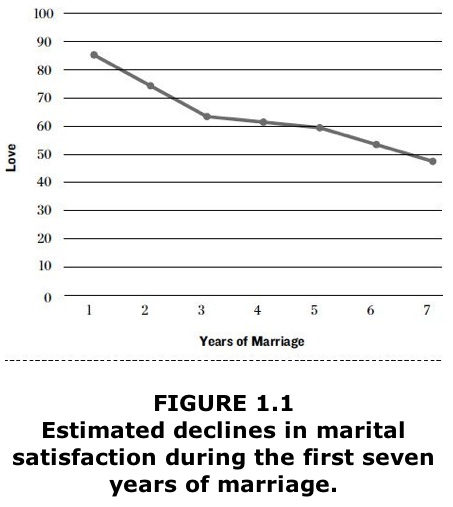
As Daniel Jones, author of Love Illuminated, explains: we spend youth asking “How do I find love?” and midlife asking “How do I get it back?”
Anyone in a relationship or who plans on being in one needs to know how to keep love alive over the long term.
But how do you learn the secret to this? Everyone is happy to explain “how they met” but few give the details on “how they stayed together.”
So let’s look at what science has to say.
“Happily Ever After” Ain’t Easy
Aside from being the epitome of lazy writing, “happily ever after” is not simple.
Ty Tashiro explains that couples in their first year of marriages score 86% for marriage satisfaction. By the seventh year, it’s under 50%.

Yes, about 50% of couples get divorced. Another 10-15% separate but do not file paperwork. And 7 more percent are chronically unhappy.
So the real stat is two-thirds of marriages do not live “happily ever after.”
Via The Science of Happily Ever After: What Really Matters in the Quest for Enduring Love:
The divorce rate often reported by the media is 50 percent, which is based on Census Bureau data. However, census data does not capture the 10 to 15 percent of couples who permanently separate but do not file formal paperwork for a legal divorce. This means that a conservative estimate of the divorce and permanent separation rate is 60 percent. Add the additional 7 percent of chronically unhappy couples who do not divorce or permanently separate but are consistently unhappy in their marriage, and this means that two-thirds of all married couples do not live happily ever after.
Why is marriage so hard over the long term?
One of the main reasons is what science calls it “habituation.” Which is a fancy way of saying we get bored.
Early on, when a couple can finish each other’s sentences it’s romantic. But over time “predictable” is a huge negative.
Chris Rock gets the point across humorously in this video (NSFW):
Robert Greene, author of The Art of Seduction, explains that surprise is key to romantic feelings:
Seduction involves a degree of surprise, which is generally the first thing that disappears after you’ve been in a relationship, and why there’s no more seducing that goes on. Everything is familiar and you’re no longer surprised by the other person.
So is there any way to bring those tingles back?
Yes. Here’s how.
What You Can Learn From Arranged Marriages
“Arranged marriage! AGH! Weird!”
Hold on a sec. We can learn something here. What do researchers find when they compare at 50 arranged marriages and 50 “love” marriages?
Love marriages start out happier — but that declines quickly.
Arranged marriages start out less happy, but after 10 years, they’re happier than love marriages. And stay that way.
Via The Art of Choosing:
The couples who had married for love and been together less than a year averaged a score of 70 points out of a possible 91 on the love scale, but these numbers steadily fell over time. The love couples who had been married ten years or longer had an average score of only 40 points. In contrast, the couples in arranged marriages were less in love at the outset, averaging 58 points, but their feelings increased over time to an average score of 68 at the ten or more years mark.
What’s the secret behind the long term success of arranged marriages?
They have to work at it.
They don’t passively rely on “magic” and intense emotion. They have to spend a lot of time thinking about how to make it work.
Via Love Illuminated:
That process of discovery is ostensibly the fun of courtship, too, except that in arranged marriage the goal is to figure out how to be married, not whether to marry.
Research shows expecting a fairy tale relationship is a prescription for disappointment.
Via 100 Simple Secrets of Great Relationships:
Elements of fairy tales such as Cinderella were present in 78 percent of people’s beliefs about romantic love. Those people were more likely to have experienced disillusionment, devastation, and angst in their relationships than were those who gave less credence to fairy tales. – Lockhart 2000
Feeling like it’s all magic means it’s out of your control — and that without that initial magic, it’s hopeless.
The happiness of arranged marriages means a couple can make magic if they try.
So you need to actively keep the marriage happy. How do you do that?
Don’t Fix The Bad. Increase The Good.
Look at your spouse as something you purchased “as-is.” Research shows trying to change them doesn’t work:
…when participants (N = 160) focused their relationship improvement attempts on changing the partner, individuals reported more negative improvement strategies, lower improvement success, and, in turn, more negative relationship evaluations… results suggest that targeting the partner may do more harm than good despite that relationship evaluations pivot on whether the partner produces change.
John Gottman, researcher and author of The Seven Principles for Making Marriage Work, says 69% of a couple’s problems are perpetual.
These problems don’t go away yet many couples keep arguing about them year after year.
Via The Seven Principles for Making Marriage Work:
Most marital arguments cannot be resolved. Couples spend year after year trying to change each other’s mind – but it can’t be done. This is because most of their disagreements are rooted in fundamental differences of lifestyle, personality, or values. By fighting over these differences, all they succeed in doing is wasting their time and harming their marriage.
So if you can’t change them and they won’t change you, how can you reduce the bad stuff?
You can’t. But you don’t need to.
The best relationships are more about increasing the good than reducing the bad.
Divorce may have less to do with an increase in conflict and more to do with a decrease in positive feelings.
Via Flourish: A Visionary New Understanding of Happiness and Well-being:
Shelly Gable, professor of psychology at the University of California at Santa Barbara, has demonstrated that how you celebrate is more predictive of strong relations than how you fight.
Okay, so you need to increase the good times. What’s the best way to do that?
(This part is exciting. I mean, literally.)
Forget Romance. Think Excitement.
Think a pleasant date night is all it takes to keep love alive?
Researchers did a 10 week study comparing couples that engaged in “pleasant” activities vs “exciting” activities. Pleasant lost.
Via For Better: How the Surprising Science of Happy Couples Can Help Your Marriage Succeed:
Those who had undertaken the “exciting” date nights showed a significantly greater increase in marital satisfaction than the “pleasant” date night group…
Why would doing anything exciting have such a big effect on a relationship?
Because we’re lousy about realizing where our feelings are coming from.
Excitement from any source will be associated with the person you’re with, even if they’re not the cause of it.
As happiness researcher Sonja Lyubomirsky explains, excitement experienced mutually brings the tingles back.
…Whether the couples were only dating or long-married, the ones who did the shared novel activity were more likely than the ones who did the shared neutral activity to agree to statements like “I feel happy when I am doing something to make my partner happy” and “I feel ‘tingling’ and ‘an increased heartbeat’ when I think of my partner” after the activity than before.
So no boring, lame date nights. Go do something exciting. Go dancing together or anything else you can both participate in as a couple.
Sum Up
Keeping love alive can be tricky. You need to actively work at it and it’s more important to increase the good then to reduce the bad.
And the best way to do that is by increasing excitement.
So you’re hopping on roller coasters and going white water rafting — but what do you need to do when you’re there?
Pretend you’re on your first date.
Studies show pretending time with a romantic partner was a first date makes it more enjoyable for you and for your partner:
Across a series of studies, participants underestimated how good they would feel in situations that required them to put their best face forward… participants who were instructed to engage in self-presentation felt happier after interacting with their romantic partner than participants who were not given this instruction…
Why? On first dates we make an effort to impress. And we’re full of hope.
Love means being a little delusional (Some researchers even think love might qualify as a mental illness.)
Thinking your partner is better than they really are makes for longer, better relationships.
Via The Science of Love:
Sandra Murray and her colleagues have been studying romantic relationships now for several decades, and have found that idealising one’s partner is a sure recipe for marital success; moreover, the higher one’s ideals are and the more one idealises one’s partner, the more satisfied one is with the relationship – and the longer it is likely to last.
Letting yourself be a little crazy — crazy for your partner — pays off.
What’s Next?
Other posts you should read on improving marriage, love and romance:
Want to learn more? Join 45K+ readers. Get a free weekly update via email here.
This piece originally appeared on Barking Up the Wrong Tree.
More Must-Reads From TIME
- The 100 Most Influential People of 2024
- Coco Gauff Is Playing for Herself Now
- Scenes From Pro-Palestinian Encampments Across U.S. Universities
- 6 Compliments That Land Every Time
- If You're Dating Right Now , You're Brave: Column
- The AI That Could Heal a Divided Internet
- Fallout Is a Brilliant Model for the Future of Video Game Adaptations
- Want Weekly Recs on What to Watch, Read, and More? Sign Up for Worth Your Time
Contact us at letters@time.com